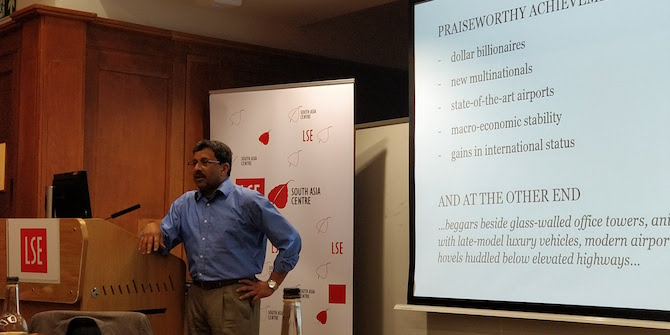Historians have for long recognised the extent to which South Asia has acted as a crucible for the development of modern forms of capitalism and labour relations, rather than act as their mere receptacle. But how have new forms of capitalism shaped the working lives of South Asia today, as well as the organisations and dynamics of the cities, societies and countries in which they live? Is the South Asian experience of global capitalism distinctive, and to what extent an understanding of them might have implications for shifting the conceptual understandings of capitalism itself?
Ahead of the first roundtable of LSE South Asia Centre and Sussex Asia Centre’s discussion series ‘What does the study of South Asia teach us about …’ read a selection of posts from South Asia @ LSE on capitalism across South Asia.
- Corruption is both a symptom of the basic structures of capitalism, and a technology that supports them
- “Capitalism in its current form is incomplete because it misinterprets human beings as robots driven only by self-interest” – Muhammud Yunus
- GDP growth, export boom and rising corruption in Bangladesh
- Poverty of Vision: Neglecting growing class inequality in post-war Sri Lanka?
- Where are India’s working women? The fall and fall of India’s female labour participation rate
- Can adverts persuade citizens to file their taxes in Pakistan?
- JLF 2019 Interview: Sven Beckert ‘Empire of Cotton’
- Rural Bangladeshi women: Empowerment, farming and life satisfaction
- Photo Essay: Climate crisis and globalization in the Bay of Bengal
- Why have anti-corruption efforts failed in Bangladesh?
- Sri Lanka: Remittances and the failed promise of ‘Migration-Development’
- Why Bangladesh’s dependence on FDI means low wages and poor working conditions for garment workers will continue
- Power politics and energy trade in South Asia
- Poverty in South Asia: The long view
- The invisible lives of Delhi’s home-based garment workers
- LSE-UC Berkeley Bangladesh Summit 2: Bangladesh Garment Workers Strike
- How a Sri Lankan port can help integrate the Indian Ocean economy
- Apps and the gender gap: Why ‘mobile money’ leaves poor women behind
- Why Amartya Sen remains the century’s great critic of capitalism
This article gives the views of the author, and not the position of the South Asia @ LSE blog, nor of the London School of Economics. Featured image: High-rise building. Credit: Nitin Mendekar, Unsplash.







